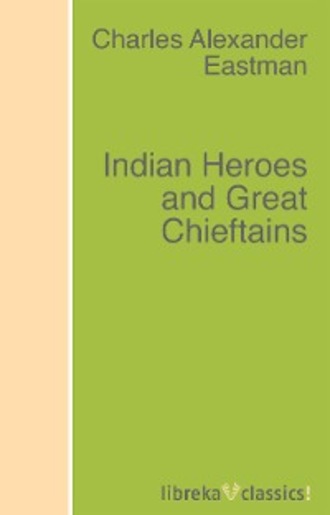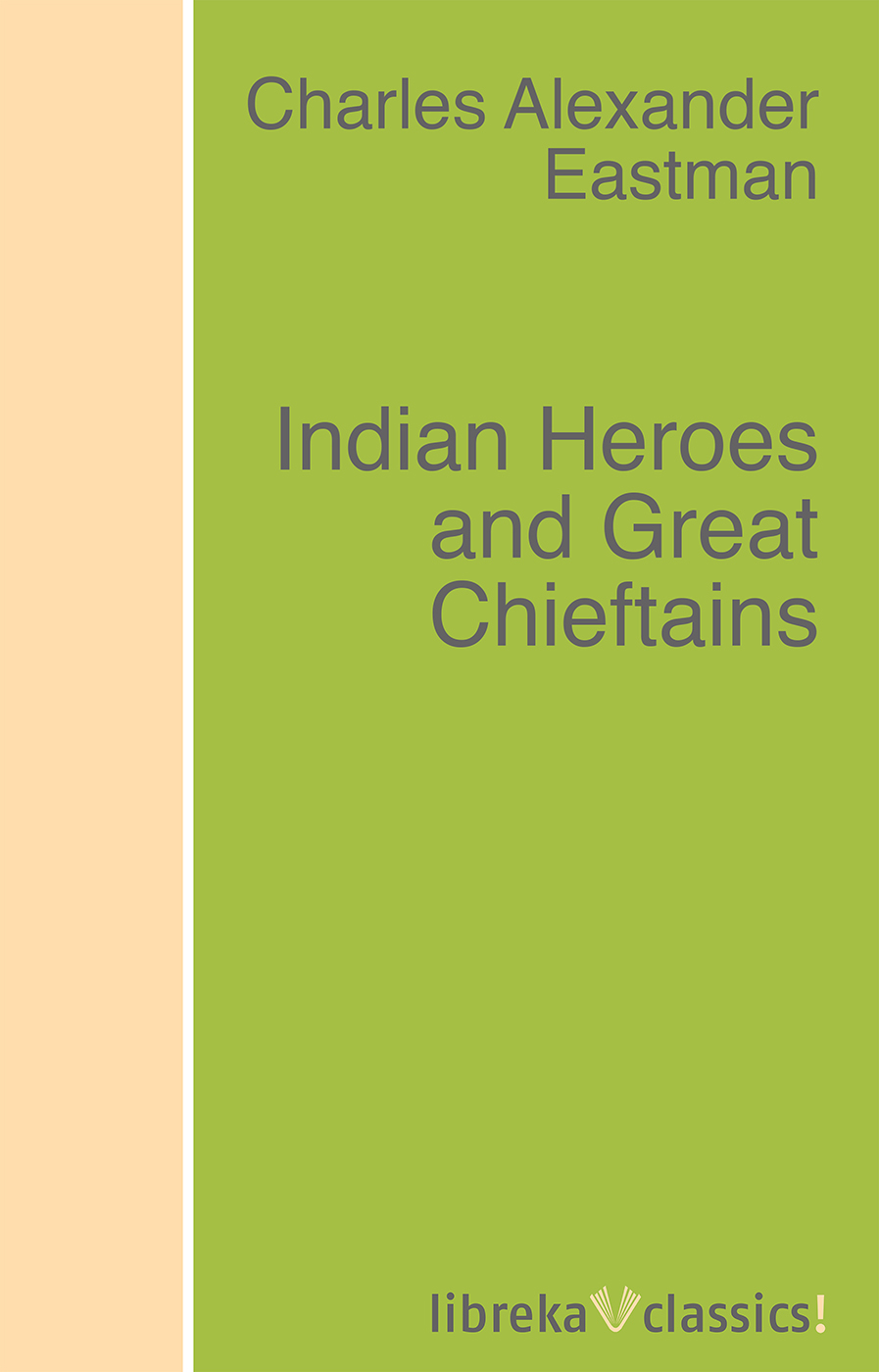
Полная версия
Indian Heroes and Great Chieftains


Titel: Indian Heroes and Great Chieftains
von Scott Hemphill, L. M. Montgomery, L. Frank Baum, John Milton, René Descartes, Baroness Emmuska Orczy Orczy, Karl Marx, Friedrich Engels, Edgar Rice Burroughs, Unknown, Norman F. Joly, Norman Coombs, David Slowinski, Mark Twain, Henry David Thoreau, Stephen Crane, John Goodwin, Nathaniel Hawthorne, Winn Schwartau, Odd De Presno, Sir Walter Scott, Jules Verne, Mary Wollstonecraft Shelley, United States. Central Intelligence Agency, United States, Canada, Willa Sibert Cather, Anthony Hope, Edwin Abbott Abbott, Charles Dickens, Frederick Douglass, William Shakespeare, Bruce Sterling, Franklin Delano Roosevelt, Jane Austen, Thomas Hardy, Sir Arthur Conan Doyle, Edna St. Vincent Millay, Gene Stratton-Porter, Richard McGowan, Frances Hodgson Burnett, United States. Bureau of the Census, Electronic Frontier Foundation, Robert Louis Stevenson, Anonymous, Jerry Bonnell, Robert Nemiroff, Andrew Lang, G. K. Chesterton, John Bunyan, Sunzi 6th cent. B.C., Harold Frederic, Mary Wollstonecraft, Victor Hugo, René Doumic, Upton Sinclair, Virginia Woolf, George Eliot, Thomas Paine, Benjamin Franklin, Plato, Samuel Taylor Coleridge, Ruth M. Sprague, William Dean Howells, Wilkie Collins, Jean Webster, H. G. Wells, Kate Chopin, Mark Eliot Laxer, Louisa May Alcott, Frank Norris, Edith Wharton, S. D. Humphrey, Henry Hunt Snelling, William Morris, Mrs. Susanna Rowson, Christopher Morley, Sax Rohmer, Oscar Wilde, Gaston Leroux, Henry James, Project Gutenberg, Harriet Beecher Stowe, Various, Robert W. Service, A. B. Paterson, Henry Lawson, Jack London, Laozi, D. H. Lawrence, Julius Caesar, Joseph Conrad, W. Somerset Maugham, George MacDonald, Marcus Tullius Cicero, Virgil, Theodore Dreiser, Giuseppe Salza, Rudyard Kipling, ca. 50 BCE-16 BCE Sextus Propertius, Robert A. Harris, William Wells Brown, graf Leo Tolstoy, Omar Khayyám, Michael Hart, Library of Congress. Copyright Office, Coalition for Networked Information, Geoffrey Chaucer, Adam Lindsay Gordon, Hiram Corson, Robert Browning, Amy Lowell, Rupert Brooke, Joyce Kilmer, John Gower, Saki, Kenneth Grahame, Anna Sewell, Martin Luther, Philipp Melanchthon, National Atomic Museum, Alexander William Kinglake, Charles John Cutcliffe Wright Hyne, Amelia Edith Huddleston Barr, James Branch Cabell, Bayard Taylor, Horatio Alger, Booth Tarkington, Hjalmar Hjorth Boyesen, Michael Husted, Émile Gaboriau, Jerome K. Jerome, Stephen Vincent Benét, Edwin Arlington Robinson, J. Frank Dobie, Joseph Rodman Drake, Eliot Gregory, John Fox, John Muir, Richard Harding Davis, Edgar A. Guest, Mary Roberts Rinehart, Thomas Nelson Page, Sir Walter Alexander Raleigh, Rebecca Harding Davis, Charles Alexander Eastman
ISBN 978-3-7429-0297-9
Alle Rechte vorbehalten.
Es ist ohne vorherige schriftliche Erlaubnis nicht gestattet, dieses Werk im Ganzen oder in Teilen zu vervielfältigen oder zu veröffentlichen.
INDIAN HEROES AND GREAT CHIEFTAINS
By Charles A. Eastman (Ohiyesa)
Contents
INDIAN HEROES AND GREAT CHIEFTAINS RED CLOUD SPOTTED TAIL LITTLE CROW TAMAHAY GALL CRAZY HORSE SITTING BULL RAIN-IN-THE-FACE TWO STRIKE AMERICAN HORSE DULL KNIFE ROMAN NOSE CHIEF JOSEPH LITTLE WOLF HOLE-IN-THE-DAY
INDIAN HEROES AND GREAT CHIEFTAINS
RED CLOUD
EVERY age, every race, has its leaders and heroes. There were over sixty distinct tribes of Indians on this continent, each of which boasted its notable men. The names and deeds of some of these men will live in American history, yet in the true sense they are unknown, because misunderstood. I should like to present some of the greatest chiefs of modern times in the light of the native character and ideals, believing that the American people will gladly do them tardy justice.
It is matter of history that the Sioux nation, to which I belong, was originally friendly to the Caucasian peoples which it met in succession-first, to the south the Spaniards; then the French, on the Mississippi River and along the Great Lakes; later the English, and finally the Americans. This powerful tribe then roamed over the whole extent of the Mississippi valley, between that river and the Rockies. Their usages and government united the various bands more closely than was the case with many of the neighboring tribes.
During the early part of the nineteenth century, chiefs such as Wabashaw, Redwing, and Little Six among the eastern Sioux, Conquering Bear, Man-Afraid-of-His-Horse, and Hump of the western bands, were the last of the old type. After these, we have a coterie of new leaders, products of the new conditions brought about by close contact with the conquering race.
This distinction must be borne in mind—that while the early chiefs were spokesmen and leaders in the simplest sense, possessing no real authority, those who headed their tribes during the transition period were more or less rulers and more or less politicians. It is a singular fact that many of the "chiefs", well known as such to the American public, were not chiefs at all according to the accepted usages of their tribesmen. Their prominence was simply the result of an abnormal situation, in which representatives of the United States Government made use of them for a definite purpose. In a few cases, where a chief met with a violent death, some ambitious man has taken advantage of the confusion to thrust himself upon the tribe and, perhaps with outside help, has succeeded in usurping the leadership.
Red Cloud was born about 1820 near the forks of the Platte River. He was one of a family of nine children whose father, an able and respected warrior, reared his son under the old Spartan regime. The young Red Cloud is said to have been a fine horseman, able to swim across the Missouri and Yellowstone rivers, of high bearing and unquestionable courage, yet invariably gentle and courteous in everyday life. This last trait, together with a singularly musical and agreeable voice, has always been characteristic of the man.
When he was about six years old, his father gave him a spirited colt, and said to him:
"My son, when you are able to sit quietly upon the back of this colt without saddle or bridle, I shall be glad, for the boy who can win a wild creature and learn to use it will as a man be able to win and rule men."
The little fellow, instead of going for advice and help to his grandfather, as most Indian boys would have done, began quietly to practice throwing the lariat. In a little while he was able to lasso the colt. He was dragged off his feet at once, but hung on, and finally managed to picket him near the teepee. When the big boys drove the herd of ponies to water, he drove his colt with the rest. Presently the pony became used to him and allowed himself to be handled. The boy began to ride him bareback; he was thrown many times, but persisted until he could ride without even a lariat, sitting with arms folded and guiding the animal by the movements of his body. From that time on he told me that he broke all his own ponies, and before long his father's as well.
The old men, his contemporaries, have often related to me how Red Cloud was always successful in the hunt because his horses were so well broken. At the age of nine, he began to ride his father's pack pony upon the buffalo hunt. He was twelve years old, he told me, when he was first permitted to take part in the chase, and found to his great mortification that none of his arrows penetrated more than a few inches. Excited to recklessness, he whipped his horse nearer the fleeing buffalo, and before his father knew what he was about, he had seized one of the protruding arrows and tried to push it deeper. The furious animal tossed his massive head sidewise, and boy and horse were whirled into the air. Fortunately, the boy was thrown on the farther side of his pony, which received the full force of the second attack. The thundering hoofs of the stampeded herd soon passed them by, but the wounded and maddened buffalo refused to move, and some critical moments passed before Red Cloud's father succeeded in attracting its attention so that the boy might spring to his feet and run for his life.
I once asked Red Cloud if he could recall having ever been afraid, and in reply he told me this story. He was about sixteen years old and had already been once or twice upon the warpath, when one fall his people were hunting in the Big Horn country, where they might expect trouble at any moment with the hostile Crows or Shoshones. Red Cloud had followed a single buffalo bull into the Bad Lands and was out of sight and hearing of his companions. When he had brought down his game, he noted carefully every feature of his surroundings so that he might at once detect anything unusual, and tied his horse with a long lariat to the horn of the dead bison, while skinning and cutting up the meat so as to pack it to camp. Every few minutes he paused in his work to scrutinize the landscape, for he had a feeling that danger was not far off.
Suddenly, almost over his head, as it seemed, he heard a tremendous war whoop, and glancing sidewise, thought he beheld the charge of an overwhelming number of warriors. He tried desperately to give the usual undaunted war whoop in reply, but instead a yell of terror burst from his lips, his legs gave way under him, and he fell in a heap. When he realized, the next instant, that the war whoop was merely the sudden loud whinnying of his own horse, and the charging army a band of fleeing elk, he was so ashamed of himself that he never forgot the incident, although up to that time he had never mentioned it. His subsequent career would indicate that the lesson was well learned.
The future leader was still a very young man when he joined a war party against the Utes. Having pushed eagerly forward on the trail, he found himself far in advance of his companions as night came on, and at the same time rain began to fall heavily. Among the scattered scrub pines, the lone warrior found a natural cave, and after a hasty examination, he decided to shelter there for the night.
Scarcely had he rolled himself in his blanket when he heard a slight rustling at the entrance, as if some creature were preparing to share his retreat. It was pitch dark. He could see nothing, but judged that it must be either a man or a grizzly. There was not room to draw a bow. It must be between knife and knife, or between knife and claws, he said to himself.
The intruder made no search but quietly lay down in the opposite corner of the cave. Red Cloud remained perfectly still, scarcely breathing, his hand upon his knife. Hour after hour he lay broad awake, while many thoughts passed through his brain. Suddenly, without warning, he sneezed, and instantly a strong man sprang to a sitting posture opposite. The first gray of morning was creeping into their rocky den, and behold! a Ute hunter sat before him.
Desperate as the situation appeared, it was not without a grim humor. Neither could afford to take his eyes from the other's; the tension was great, till at last a smile wavered over the expressionless face of the Ute. Red Cloud answered the smile, and in that instant a treaty of peace was born between them.
"Put your knife in its sheath. I shall do so also, and we will smoke together," signed Red Cloud. The other assented gladly, and they ratified thus the truce which assured to each a safe return to his friends. Having finished their smoke, they shook hands and separated. Neither had given the other any information. Red Cloud returned to his party and told his story, adding that he had divulged nothing and had nothing to report. Some were inclined to censure him for not fighting, but he was sustained by a majority of the warriors, who commended his self-restraint. In a day or two they discovered the main camp of the enemy and fought a remarkable battle, in which Red Cloud especially distinguished himself
The Sioux were now entering upon the most stormy period of their history. The old things were fast giving place to new. The young men, for the first time engaging in serious and destructive warfare with the neighboring tribes, armed with the deadly weapons furnished by the white man, began to realize that they must soon enter upon a desperate struggle for their ancestral hunting grounds. The old men had been innocently cultivating the friendship of the stranger, saying among themselves, "Surely there is land enough for all!"
Red Cloud was a modest and little known man of about twenty-eight years, when General Harney called all the western bands of Sioux together at Fort Laramie, Wyoming, for the purpose of securing an agreement and right of way through their territory. The Ogallalas held aloof from this proposal, but Bear Bull, an Ogallala chief, after having been plied with whisky, undertook to dictate submission to the rest of the clan. Enraged by failure, he fired upon a group of his own tribesmen, and Red Cloud's father and brother fell dead. According to Indian custom, it fell to him to avenge the deed. Calmly, without uttering a word, he faced old Bear Bull and his son, who attempted to defend his father, and shot them both. He did what he believed to be his duty, and the whole band sustained him. Indeed, the tragedy gave the young man at once a certain standing, as one who not only defended his people against enemies from without, but against injustice and aggression within the tribe. From this time on he was a recognized leader.
Man-Afraid-of-His-Horse, then head chief of the Ogallalas, took council with Red Cloud in all important matters, and the young warrior rapidly advanced in authority and influence. In 1854, when he was barely thirty-five years old, the various bands were again encamped near Fort Laramie. A Mormon emigrant train, moving westward, left a footsore cow behind, and the young men killed her for food. The next day, to their astonishment, an officer with thirty men appeared at the Indian camp and demanded of old Conquering Bear that they be given up. The chief in vain protested that it was all a mistake and offered to make reparation. It would seem that either the officer was under the influence of liquor, or else had a mind to bully the Indians, for he would accept neither explanation nor payment, but demanded point-blank that the young men who had killed the cow be delivered up to summary punishment. The old chief refused to be intimidated and was shot dead on the spot. Not one soldier ever reached the gate of Fort Laramie! Here Red Cloud led the young Ogallalas, and so intense was the feeling that they even killed the half-breed interpreter.
Curiously enough, there was no attempt at retaliation on the part of the army, and no serious break until 1860, when the Sioux were involved in troubles with the Cheyennes and Arapahoes. In 1862, a grave outbreak was precipitated by the eastern Sioux in Minnesota under Little Crow, in which the western bands took no part. Yet this event ushered in a new period for their race. The surveyors of the Union Pacific were laying out the proposed road through the heart of the southern buffalo country, the rendezvous of Ogallalas, Brules, Arapahoes, Comanches, and Pawnees, who followed the buffalo as a means of livelihood. To be sure, most of these tribes were at war with one another, yet during the summer months they met often to proclaim a truce and hold joint councils and festivities, which were now largely turned into discussions of the common enemy. It became evident, however, that some of the smaller and weaker tribes were inclined to welcome the new order of things, recognizing that it was the policy of the government to put an end to tribal warfare.
Red Cloud's position was uncompromisingly against submission. He made some noted speeches in this line, one of which was repeated to me by an old man who had heard and remembered it with the remarkable verbal memory of an Indian.
"Friends," said Red Cloud, "it has been our misfortune to welcome the white man. We have been deceived. He brought with him some shining things that pleased our eyes; he brought weapons more effective than our own: above all, he brought the spirit water that makes one forget for a time old age, weakness, and sorrow. But I wish to say to you that if you would possess these things for yourselves, you must begin anew and put away the wisdom of your fathers. You must lay up food, and forget the hungry. When your house is built, your storeroom filled, then look around for a neighbor whom you can take at a disadvantage, and seize all that he has! Give away only what you do not want; or rather, do not part with any of your possessions unless in exchange for another's.
"My countrymen, shall the glittering trinkets of this rich man, his deceitful drink that overcomes the mind, shall these things tempt us to give up our homes, our hunting grounds, and the honorable teaching of our old men? Shall we permit ourselves to be driven to and fro—to be herded like the cattle of the white man?"
His next speech that has been remembered was made in 1866, just before the attack on Fort Phil Kearny. The tension of feeling against the invaders had now reached its height. There was no dissenting voice in the council upon the Powder River, when it was decided to oppose to the uttermost the evident purpose of the government. Red Cloud was not altogether ignorant of the numerical strength and the resourcefulness of the white man, but he was determined to face any odds rather than submit.
"Hear ye, Dakotas!" he exclaimed. "When the Great Father at Washington sent us his chief soldier [General Harney] to ask for a path through our hunting grounds, a way for his iron road to the mountains and the western sea, we were told that they wished merely to pass through our country, not to tarry among us, but to seek for gold in the far west. Our old chiefs thought to show their friendship and good will, when they allowed this dangerous snake in our midst. They promised to protect the wayfarers.
"Yet before the ashes of the council fire are cold, the Great Father is building his forts among us. You have heard the sound of the white soldier's ax upon the Little Piney. His presence here is an insult and a threat. It is an insult to the spirits of our ancestors. Are we then to give up their sacred graves to be plowed for corn? Dakotas, I am for war!"
In less than a week after this speech, the Sioux advanced upon Fort Phil Kearny, the new sentinel that had just taken her place upon the farthest frontier, guarding the Oregon Trail. Every detail of the attack had been planned with care, though not without heated discussion, and nearly every well-known Sioux chief had agreed in striking the blow. The brilliant young war leader, Crazy Horse, was appointed to lead the charge. His lieutenants were Sword, Hump, and Dull Knife, with Little Chief of the Cheyennes, while the older men acted as councilors. Their success was instantaneous. In less than half an hour, they had cut down nearly a hundred men under Captain Fetterman, whom they drew out of the fort by a ruse and then annihilated.




